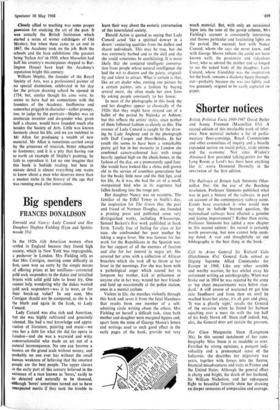Shorter notices
British Political Facts 1900-1967 David Butler and Jennie Freeman (Macmillan 63s). A second edition of this invaluable work of refer- ence. New material includes a list of parlia- mentary floor-crossings, Royal Commissions and other committees of inquiry and a heavily expanded section on social policy, trade unions and the economy. 'Not since Wisden's Almanack first provided talking-points for the Long Room at Lord's has there been anything like it,' wrote Desmond Donnelly in the SPECTATOR of the first edition.
The Railways of Britain Jack Simmons (Mac- millan 50s). On the eve of the Beeching revolution, Professor Simmons published what was in part a history of the railways, in part an account of the contemporary railway scene. Events have overtaken it—who would now say that in Suffoll0 'beyond question, the nationalised railways have effected a genuine and lasting improvement'? Rather than revise, Professor Simmons has added a new chapter to this second edition: his record is certainly worth preserving, but now cannot help seem- ing dated. A vast and thoughtfully set Out bibliography is the best thing in the book. • Call to Arms General Sir Richard Gale (Hutchinson 45s). General Gale retired as Deputy Supreme Allied Commander for Europe in 1960. Like any other sensible and worthy warrior, he has whiled away his retirement writing an autobiography. When war broke out in 1914 he was rejected by the army as 'my chest measurements were below stan- dard.' A stiff course of nocturnal trr got him into Sandhurst and from then on until he reached brass-hat status, it's all guts and glory. 'It was a ghastly sight,' recalls the General of the occasion when he found his batman squatting over a mess tin with the top half of his body blown off. Stern stuff indeed, but, alas, the General does not sustain the pressure.
Pier Glass Marguerite Steen (Longmans 30s). In this second instalment of her auto- biography Miss Steen is as readable as ever. Fortified by strong opinions, a pungent indi- viduality and a pronounced sense of the ludicrous, she describes her migratory war years, together with forays into the theatre, financial misadventures and visits to France and the United States. Although the general effect is chatty and bright, the death of her husband, Sir, William Nicholson, and her subsequent night to beautiful Tenerife show her drawing on deeper resources of compassion and courage.






































 Previous page
Previous page